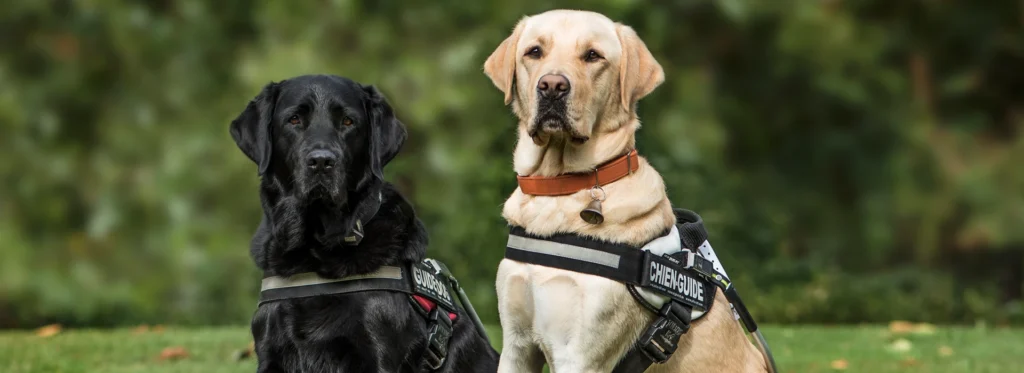Service Dog Training
Helping you build a strong bond with your dog through effective training and techniques.

Service Dog Training: Transforming Lives Through Purposeful Partnership
Service dogs do more than obey commands — they change lives. Unlike pets or even well-trained companions, service dogs are trained to assist individuals with specific physical, neurological, or psychological disabilities. At Insight K‑9 Solutions, we offer specialized service dog training designed to meet legal standards, functional needs, and ethical expectations.
What Is a Service Dog?
A service dog is defined under the Americans with Disabilities Act (ADA) as a dog trained to perform tasks directly related to a person’s disability. These tasks can include guiding the blind, detecting oncoming seizures, retrieving items, or interrupting panic attacks. Service dogs are granted public access rights that allow them to accompany their handlers in most environments, including restaurants, airplanes, and stores.
Who Qualifies for a Service Dog?
Not everyone qualifies for a service dog. Individuals must have a documented disability that significantly impairs one or more major life functions. Service dogs can be trained to assist with:
- Mobility and stability support
- Hearing alerts
- Seizure detection and response
- Medical alerting (e.g., blood sugar levels, heart rate changes)
- Psychiatric support for PTSD, anxiety, or autism
How Service Dog Training Differs From Obedience Training
While obedience training focuses on general manners and commands, service dog training is highly customized. It involves rigorous task-specific training, public access preparation, and extensive behavior stability. Service dogs must not only respond to their handler but also remain calm and focused in a variety of unpredictable environments.
Key Differences
- Duration: Service dog training often spans 6 months to 2 years.
- Complexity: Tasks are trained to medical-grade precision.
- Public Behavior: Service dogs are expected to remain focused, quiet, and non-reactive in busy public spaces.
- Legal Standards: Service dogs must meet ADA requirements and state-level guidelines.
Training Goals Beyond Obedience
It’s not just about sitting or staying. Service dogs learn to ignore distractions, respond to subtle cues, and perform tasks independently. For instance, a PTSD service dog may sense anxiety and apply pressure to calm their handler — a far cry from simply following a verbal command.
Our Service Dog Training Process
At Insight K‑9 Solutions, we offer individualized training programs tailored to the handler’s medical needs. Our training focuses on building reliability, safety, and trust — with the goal of long-term independence and well-being.
Steps in the Service Dog Training Journey
- Assessment: We evaluate the prospective dog’s temperament, health, and trainability. Not all dogs are suited for service work.
- Custom Plan: We design a training curriculum based on the specific disability-related tasks the dog will need to perform.
- Task Training: Dogs are taught to perform highly specific actions, such as fetching medication, grounding their handler, or alerting to health changes.
- Public Access Training: Dogs learn to behave confidently and respectfully in all public settings.
- Handler Training: We work with the owner to build communication, reinforce tasks, and pass public access evaluations.
Breed and Temperament Considerations
While any breed can theoretically be trained as a service dog, certain traits make some dogs more suitable. These include calmness, focus, low reactivity, trainability, and a strong bond with their handler. We help clients select or evaluate dogs with the right temperament for success.
Ethical and Legal Considerations
We adhere strictly to ADA guidelines and ethical practices in all service dog training. Our team ensures that every dog is trained not just to pass tests, but to genuinely improve quality of life. We do not offer shortcuts or emotional support certifications disguised as service dog credentials.
Be Wary of Online Certification Scams
There is no official federal registry or certification required for service dogs in the U.S. Be cautious of online programs that promise “instant certification” or service dog vests without proper training. Real service dogs undergo rigorous preparation, not paperwork shortcuts.
Is Service Dog Training Right for You?
If you have a qualifying disability and believe a service dog could assist with your daily needs, we’re here to guide you through every step — from selecting the right dog to full task and public access training. The journey is intensive, but the rewards are life-changing.
Start Your Training Journey with Insight K‑9 Solutions
We’re proud to offer expert-led, ethical service dog training that prioritizes your health, your rights, and your dog’s well-being. Let’s work together to build a partnership that empowers your daily life.
